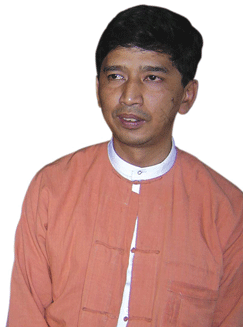Empowering Peaceful Dissent
Former student leader Min Ko Naing and his 88 Generation Students group have created a movement which gives ordinary Burmese a political voice. The celebrated social and political activist, who spent 15 years in prison for his leadership during the nationwide pro-democracy uprising in 1988, now heads a peaceful activist organization. The Irrawaddy speaks to Min Ko Naing about his group and its role in promoting democratic reform in the military-led country
Question: The 88 Generation Students’ “Open Heart Campaign” has inspired ordinary Burmese to express their views about the country openly. What is the current status of the campaign and what has it accomplished? 
Answer: The aim of the campaign is to encourage the people to exercise freedom of expression, which is their basic right. We have seen the people become increasingly aware after launching the campaign. Some citizens wrote their opinions on paper and hung them on the fence of their homes. We have received a huge amount of letters from across the country and can draw the whole picture of the Burmese people’s desires. We have categorized the letters according to social, health and economic issues, and we are preparing a research report. After that, we will announce the result to the world.
Q: You and other leaders of your group were arrested last year on the charge that your efforts might lead to civil unrest. Do you feel that the current climate in Burma could become violent?
A: I think that depends on both the regime and the democratic forces. First, we all have to avoid acting out of emotion. When we publicly express our opinions and attitudes, we always take care to avoid violence. on the other side, there should be those who have the ability to listen to us. It is crucial [for the regime] not to approach everything with doubt. If they translate the situation simply into an attempt to overthrow their power, it will end up in a great tragedy. What’s more important is the people have to exercise that right to express their desires peacefully and with nonviolent means. on the other hand, the authorities should approach them in a positive manner and choose the best way to improve the situation. If they view our activities as a threat to their power and respond violently, our future does not look good.
Q: Do you think the road to national reconciliation remains open?
A: Actually, the doors are on both sides—one on our side and another on the government’s side. Our door remains open. While we are the oppressed who have been struggling against injustice in the country, we continue to open our door because we usually find the answer to a problem is based on the principle of national reconciliation. The issue is the status of the government’s door. We will continue to knock so that we can give them the message that we need to work together in making a nation instead of annihilating each other.
Q: The military government has taken a one-sided approach to national reconciliation—one that excludes [opposition leader] Aung San Suu Kyi and the National League for Democracy. Are you prepared to accept such an approach to reform?
A: We never focus simply on the view of an individual or a party. But we can’t accept a one-sided solution, which has forcibly distorted the results of the 1990 election. If we did, how could the people believe in any future election? An election can’t guarantee anything. We have chosen nonviolent means by which people of all walks of life can participate. A government alone cannot shape a country’s future. The consent of all citizens is the most important prerequisite for governing.
Q: How can the Burmese people participate in politics under the current military regime, and what role is your group playing to establish democracy?
A: Our efforts, such as the signature campaign, white campaign and the open heart campaign, have given the people access to political actions. After we [the group leaders] were released from detention, we stood together and chose a path that the people could follow. They are so oppressed and weak that we have had to be patient in organizing them for political action. While we have chosen nonviolent means, we have encountered various kinds of oppression from the authorities.
1 | 2 next page »
